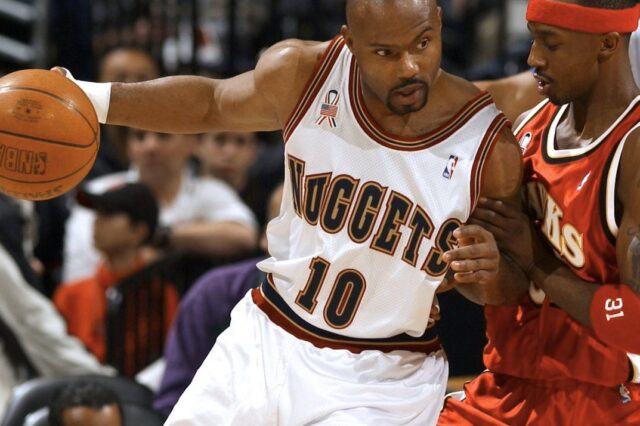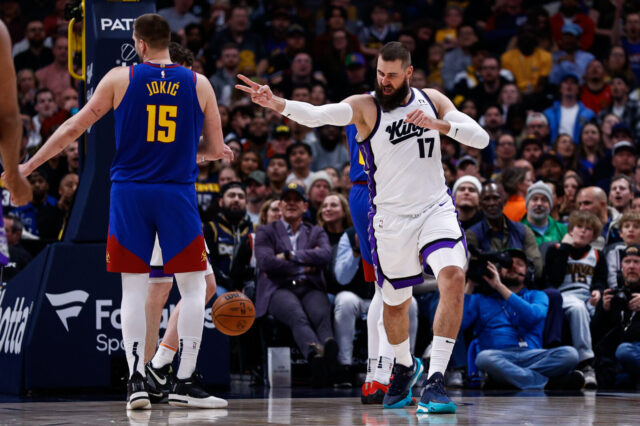It’s late March 2021. The Denver Nuggets have the 5th-best record in the Western Conference, and, on March 24th, they were slapped off of the floor by the Toronto Raptors in a 135-111 beatdown that wasn’t even close to what the final score would indicate. The team’s guard rotation features Jamal Murray, Gary Harris, Will Barton, R.J. Hampton, P.J. Dozier, Monte Morris and Facundo Campazzo along with Markus Howard when the lead or deficit had grown large enough. Denver utilizes that guard depth to swing a trade for Aaron Gordon from the Orlando Magic by sending Harris, Hampton and a future first-round pick for Gordon and Gary Clark, who played four minutes for Denver before racking up DNPs with the Philadelphia 76ers.
While losing Hampton and Harris hurt, the trade looked like a huge win for Denver. Gordon gave them an athletic, young wing that could guard bigger forwards that had given them trouble while Michael Porter Jr. could focus on furthering his offensive game. The team could start Jamal Murray and Will Barton at their guard spots with Dozier, Morris and Campazzo coming off the bench. The move also allowed Paul Millsap to slide to a reserve role to preserve himself for the playoffs and give him easier matchups. The five-man starting lineup of Murray, Barton, Gordon, Porter and Nikola Jokic played 110 total minutes together between injuries to Barton and Murray before he went down, and, in those 110 minutes, that lineup had a +16.63 net rating with an offensive rating of 128.9.
Flash forward a little over two months later, and the Nuggets are staring down a best-of-3 series against the Portland Trail Blazers against a trio of guards in Damian Lillard, C.J. McCollum and Norman Powell that are averaging 70.1 points per game with a slashline of .480/.399/.877 while Denver is starting Campazzo and Austin Rivers, who hadn’t played more than 2:45 in a game since February 7th and was signed to a contract by the Nuggets at the end of April. Injuries to Murray, Barton, Morris and Dozier all came in a flurry, and, while Morris has returned, Murray is out for the year while Barton and Dozier remain on the shelf. Denver won Games 2 & 3 behind some Jokic and Rivers heroics. How did Denver get here, and do they have enough firepower to get through this test? That’s what we’re here to find out.
What happened?
This is probably the simplest topic of the entire discussion. What happened were injuries and regression to Harris after a breakout season in 2017-18. Harris averaged 17.5 points per game while shooting 48.5 percent from the field and 39.6 percent from 3-point range. He had signed a contract extension before that season and looked like the clear third star alongside Jokic and Murray. He played in 67 games that season, which were the second-most he has suited up for to this point in his career after playing 76 games in his sophomore season. His games played were below 60 in each of the next two seasons before playing in just 39 contests in 2020-21. His contract made him the perfect piece to swing for a player like Gordon to match money, but, with his regression, Denver had to add more than just a first-round pick to get him. That extra piece became Hampton, who, while not offensively gifted at this stage of his career, looks like a legitimate defensive stopper at the guard position with his athleticism and size at 6’4” with a 6’7” wingspan.
While Gordon, along with Javale McGee as a reserve center, helped solidify Denver’s frontcourt rotation, the guard rotation had just gotten a fair bit shorter. Denver still had the bodies to cover it with the young star Murray at point guard and Barton taking on the full-time shooting guard role, but the bench minutes were now squarely on Morris, Dozier and Campazzo. That increased workload was bound to cause some problems, especially considering the fact that four of those five guards had dealt with soft-tissue injuries earlier in the season. Sure enough, that injury-bug reared its ugly head in a hurry.
- 3/25/2021: Harris, Hampton & a 2025 first-round pick are traded to the Orlando Magic for Gordon & Clark
- 4/4/2021: Murray suffers a knee injury late in a win over the Magic that sidelines him until April 12th.
- 4/9/2021: Shaquille Harrison is signed to a two-way contract with the Nuggets.
- 4/12/2021: Murray returns for a matchup against the Golden State Warriors, but he suffers a non-contact knee injury late in the team’s loss which would be announced later as a torn ACL that would sideline him for the remainder of the 2020-21 campaign.
- 4/16/2021: Morris suffers a hamstring injury in a win over the Houston Rockets that would sideline him until May 11th.
- 4/20/2021: Rivers is signed to a two-way contract with the Nuggets.
- 4/23/2021: Barton suffers a hamstring injury less than a minute into the team’s matchup with the Warriors that has kept him sidelined through at least tonight’s Game 5 matchup against Portland.
- 4/30/2021: Rivers agrees to a contract for the remainder of the season to stay with Denver.
- 5/4/2021: Dozier suffers an adductor injury against the Los Angeles Lakers that has kept him sidelined through at least Game 5 tonight with no clear timetable for a return.
Take a quick look at that. Starting on April 4th, the Nuggets went from starting Murray and Barton on one of the hottest teams in basketball, to, a month later, being without their top four guards on the depth chart. If you look at the start of the season, they were without five of their top six guards, with Campazzo as the lone holdover. Instead of Campazzo, Dozier and Morris coming off of the bench, Campazzo was starting with Morris as their only guard seeing consistent minutes off the bench. This section isn’t to say that Harris is the reason for all of these injuries. Injuries happen. It’s just part of the game. Throw in the fact that the previous shortest offseason in the NBA was in 2017 when there were just 127 days between the last game of 2016-17 and the first game of 2017-18 compared to 72 for this year, and injuries were bound to rack up in a hurry. Harris wasn’t the cause of all of these injuries, but his regression was a large domino in what has been a nightmare two months for Denver’s guard rotation.
What’s Going On?
While this is a key line in the 1994 classic What’s Up by 4 Non Blondes, that’s not what we’re talking about here. Instead, we’re looking at what Denver’s been doing through four games to end up in a 2-2 tie with three games remaining in their Round 1 series. Until Barton or Dozier, it’s likely that they’re not changing up the starting unit. Morris’ ability to initiate the offense is too important on the second unit, and they need Campazzo’s feisty defense to harass Lillard as much as possible with the starters.
In Game 1, Denver lost by 14 after they got outscored by 13 in the third quarter while Portland poured in 15 points on 50 percent shooting from 3-point range in the period. Denver also had zero free-throw attempts in the period while Portland went 7-of-7 at the charity stripe. Portland got 65 points on the night from their top three guards. Meanwhile, Denver’s trio of Campazzo, Rivers and Morris had 24 with 10 of those coming from Morris on 10 shots. Portland shot 19-of-40 from 3-point range with Lillard, CJ and Powell going 13-of-28 from downtown. With Porter going 1-of-10 from downtown, the team just didn’t have the firepower to keep up. Denver’s guards didn’t show up well in Game 1, but the stars did with Jokic, Gordon and MPJ scoring 75 points on 51.6 percent shooting. If Denver’s guards had provided a little more scoring punch in one area or another, that could have swung the game in Denver’s favor.
Through four games, outside of Rivers’ 21-point outburst in Game 3, a Nuggets’ guard has yet to score more than 12 points in a game. With Murray and Barton out, this team has even more focus on their frontcourt to carry the workload on offense. Jokic and Porter are capable of doing that, but they also need the backcourt to provide the threat of scoring to open up room for them to work, especially with the struggles of Porter who scored three points on three shots in the Game 4 blowout which was only the sixth time all season he had failed to score in double digits while playing greater than 20 minutes per game, and one of those outings was the team’s penultimate game against the Detroit Pistons on May 14th. Denver is getting next-to-no scoring from their guards, and they’re not exactly locking things down on the defensive end. While reinforcements are hopefully on their way, these guards need to act like they’re the last line of the defense because they are until something changes.
What now?
The Western Conference has three of its four series in 2-2 ties. Meanwhile, the Eastern Conference has already had one sweep with the other three series being nearing their end at 3-1 after the Washington Wizards avoided the sweep last night at home. Denver has home-court advantage in this series, and, while stretching it to seven games gives them the best chance of a Barton return, they’ll want to end this one as soon as possible to rest as much as they can.
Lillard shot 1-of-10 in Game 4 which the Blazers won by 20 points. However, he had 10 assists in the game. When you’re getting that type of shooting game from Lillard, Denver can’t lose those games. Guarding Lillard, who is averaging a series-high 38.2 minutes per game, is not just a one-man job. One player who should be getting more burn in that role is Harrison. Harrison doesn’t bring much to the offensive end of the floor, but he makes up for that on defense. At 6’7” and 190 pounds, he’s another long body that you can throw at Lillard. Among players that have suited up for more than 20 minutes for Denver, he’s number one in defensive rating and defensive win shares.
With Campazzo and Harrison soaking up the majority of the minutes on Lillard, it’s up to Rivers, Morris and Porter/Gordon to slow down McCollum and Powell. Portland’s frontcourt isn’t going to beat you. Jusuf Nurkic has put up some strong games, but he’s not going to beat Jokic on the majority of nights. If you’re getting beat by the guards and they’re hitting tough shots, you tip your cap and say good job. The one problem with that is the number of uncontested shots the Blazers are getting. Through four games, Lillard is seeing 38.9 percent of his 3-point attempts as open or wide-open which are defined as shots with 4+ feet between the shooter and the closest defender. McCollum is getting those looks on 25.4 percent of his triples, and Powell is getting them 26.5 percent of the time. If Denver’s guards can start contesting these looks at a better clip, they have a chance to bog down this high-octane Portland offense.


